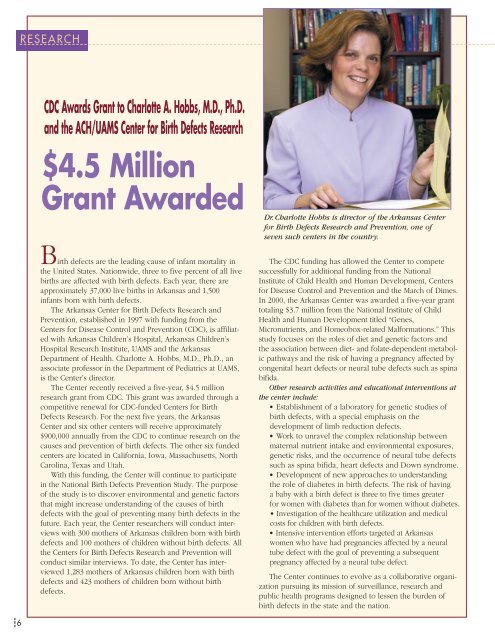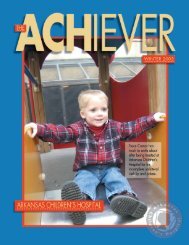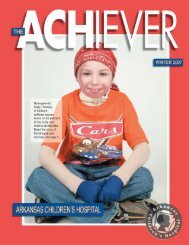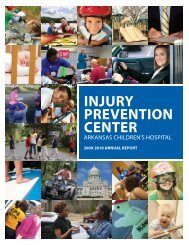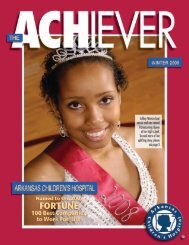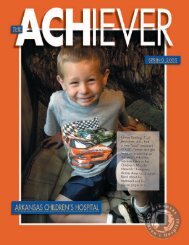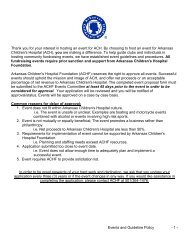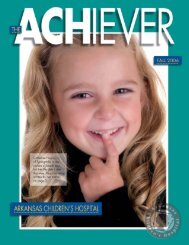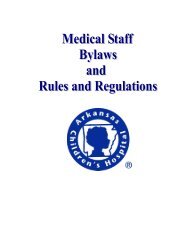Summer 2003 - Arkansas Children's Hospital
Summer 2003 - Arkansas Children's Hospital
Summer 2003 - Arkansas Children's Hospital
You also want an ePaper? Increase the reach of your titles
YUMPU automatically turns print PDFs into web optimized ePapers that Google loves.
RESEARCH<br />
CDC Awards Grant to Charlotte A. Hobbs, M.D., Ph.D.<br />
and the ACH/UAMS Center for Birth Defects Research<br />
$4.5 Million<br />
Grant Awarded<br />
Dr. Charlotte Hobbs is director of the <strong>Arkansas</strong> Center<br />
for Birth Defects Research and Prevention, one of<br />
seven such centers in the country.<br />
Birth defects are the leading cause of infant mortality in<br />
the United States. Nationwide, three to five percent of all live<br />
births are affected with birth defects. Each year, there are<br />
approximately 37,000 live births in <strong>Arkansas</strong> and 1,500<br />
infants born with birth defects.<br />
The <strong>Arkansas</strong> Center for Birth Defects Research and<br />
Prevention, established in 1997 with funding from the<br />
Centers for Disease Control and Prevention (CDC), is affiliated<br />
with <strong>Arkansas</strong> Children’s <strong>Hospital</strong>, <strong>Arkansas</strong> Children’s<br />
<strong>Hospital</strong> Research Institute, UAMS and the <strong>Arkansas</strong><br />
Department of Health. Charlotte A. Hobbs, M.D., Ph.D., an<br />
associate professor in the Department of Pediatrics at UAMS,<br />
is the Center’s director.<br />
The Center recently received a five-year, $4.5 million<br />
research grant from CDC. This grant was awarded through a<br />
competitive renewal for CDC-funded Centers for Birth<br />
Defects Research. For the next five years, the <strong>Arkansas</strong><br />
Center and six other centers will receive approximately<br />
$900,000 annually from the CDC to continue research on the<br />
causes and prevention of birth defects. The other six funded<br />
centers are located in California, Iowa, Massachusetts, North<br />
Carolina, Texas and Utah.<br />
With this funding, the Center will continue to participate<br />
in the National Birth Defects Prevention Study. The purpose<br />
of the study is to discover environmental and genetic factors<br />
that might increase understanding of the causes of birth<br />
defects with the goal of preventing many birth defects in the<br />
future. Each year, the Center researchers will conduct interviews<br />
with 300 mothers of <strong>Arkansas</strong> children born with birth<br />
defects and 100 mothers of children without birth defects. All<br />
the Centers for Birth Defects Research and Prevention will<br />
conduct similar interviews. To date, the Center has interviewed<br />
1,283 mothers of <strong>Arkansas</strong> children born with birth<br />
defects and 423 mothers of children born without birth<br />
defects.<br />
The CDC funding has allowed the Center to compete<br />
successfully for additional funding from the National<br />
Institute of Child Health and Human Development, Centers<br />
for Disease Control and Prevention and the March of Dimes.<br />
In 2000, the <strong>Arkansas</strong> Center was awarded a five-year grant<br />
totaling $3.7 million from the National Institute of Child<br />
Health and Human Development titled “Genes,<br />
Micronutrients, and Homeobox-related Malformations.” This<br />
study focuses on the roles of diet and genetic factors and<br />
the association between diet- and folate-dependent metabolic<br />
pathways and the risk of having a pregnancy affected by<br />
congenital heart defects or neural tube defects such as spina<br />
bifida.<br />
Other research activities and educational interventions at<br />
the center include:<br />
• Establishment of a laboratory for genetic studies of<br />
birth defects, with a special emphasis on the<br />
development of limb reduction defects.<br />
• Work to unravel the complex relationship between<br />
maternal nutrient intake and environmental exposures,<br />
genetic risks, and the occurrence of neural tube defects<br />
such as spina bifida, heart defects and Down syndrome.<br />
• Development of new approaches to understanding<br />
the role of diabetes in birth defects. The risk of having<br />
a baby with a birth defect is three to five times greater<br />
for women with diabetes than for women without diabetes.<br />
• Investigation of the healthcare utilization and medical<br />
costs for children with birth defects.<br />
• Intensive intervention efforts targeted at <strong>Arkansas</strong><br />
women who have had pregnancies affected by a neural<br />
tube defect with the goal of preventing a subsequent<br />
pregnancy affected by a neural tube defect.<br />
The Center continues to evolve as a collaborative organization<br />
pursuing its mission of surveillance, research and<br />
public health programs designed to lessen the burden of<br />
birth defects in the state and the nation.<br />
6


